The Future of Sustainable Agriculture in the UAE: Opportunities and Challenges
Introduction to Sustainable Agriculture in the UAE
The United Arab Emirates (UAE) has been making strides in transforming its agricultural sector, driven by the need to ensure food security and reduce dependency on imports. With the harsh desert climate posing significant challenges, the shift towards sustainable agriculture is not just an option but a necessity. This transformation is being fueled by technological innovations and governmental support, aiming to create a resilient agricultural environment.

Technological Innovations Driving Change
Hydroponics and Aquaponics
In the UAE, hydroponics and aquaponics are emerging as viable solutions for sustainable farming. These soil-less farming techniques use nutrient-rich water, allowing crops to grow in controlled environments. This approach significantly reduces water usage, which is critical in a country where water scarcity is a major concern. By adopting these methods, the UAE is taking advantage of cutting-edge agricultural technology to boost food production.
Vertical Farming
Vertical farming is another innovative approach gaining traction. By stacking multiple layers of crops in a controlled, indoor environment, vertical farming maximizes space usage and minimizes water consumption. This technique is particularly suited for urban areas, providing fresh produce locally and reducing the carbon footprint associated with transportation.

Government Initiatives and Support
The UAE government has been proactive in promoting sustainable agriculture through various initiatives. Investments in research and development, along with partnerships with international organizations, are helping to explore new agricultural technologies and practices. Policies are being implemented to support farmers in adopting sustainable methods, offering incentives for those who embrace environmentally friendly practices.
Challenges in Implementing Sustainable Agriculture
Climate and Resource Limitations
The UAE's extreme climate conditions pose significant challenges to sustainable agriculture. High temperatures and limited water resources make it difficult to maintain consistent agricultural output. Overcoming these challenges requires continuous innovation and adaptation of technologies that can withstand such harsh conditions.

Economic Viability
While technological advancements offer promising solutions, they also require substantial investments. The initial costs of setting up hydroponic systems or vertical farms can be prohibitive for small-scale farmers. Ensuring economic viability is crucial for widespread adoption, necessitating financial support mechanisms from the government or private sector partnerships.
The Path Forward
As the UAE continues to pursue sustainable agriculture, collaboration between government, industry, and academia will be key. Sharing knowledge and expertise can accelerate the development of sustainable practices tailored to the UAE's unique environment. Education and training programs will also play a vital role in equipping the next generation of farmers with the skills needed to thrive in this evolving landscape.

Conclusion
The future of sustainable agriculture in the UAE holds immense potential, promising a more secure and self-sufficient food system. By embracing innovative technologies and fostering collaborative efforts, the UAE can overcome its environmental challenges and set a precedent for sustainable agricultural practices globally. The journey is fraught with challenges, but the opportunities for growth and improvement are boundless.
